Space
Sign up for our newsletter
We summarize the week's scientific breakthroughs every Thursday.
-
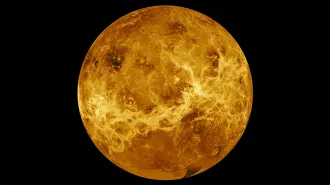 Planetary Science
Planetary ScienceUnlike Earth, the gases in Venus’ atmosphere aren’t uniformly mixed
Measurements of Venus’ atmospheric nitrogen show that a planet’s upper atmosphere doesn’t necessarily match the lower atmosphere.
-
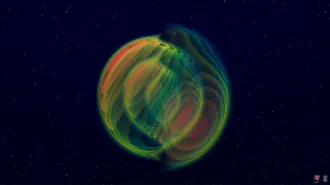 Physics
PhysicsGravitational waves have revealed the first unevenly sized black hole pair
For the first time, LIGO and Virgo scientists spotted gravitational waves produced when one big black hole merged with a smaller one.
-
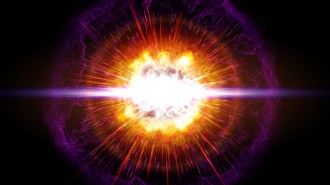 Space
SpaceA weird stellar explosion may have caused the brightest supernova yet seen
Astronomers may have spotted the first known example of a rare “pulsational pair-instability” supernova.
-
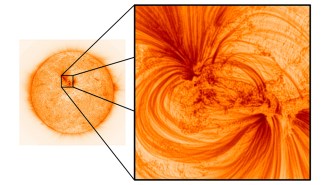 Astronomy
AstronomyNew images of the sun reveal superfine threads of glowing plasma
Snapshots from NASA’s High-Resolution Coronal Imager show thin filaments of plasma not seen before in the sun’s outer atmosphere.
-
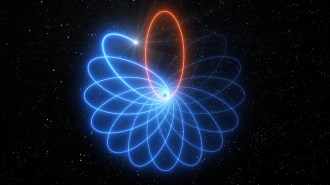 Physics
PhysicsA star orbiting the Milky Way’s giant black hole confirms Einstein was right
An oddity previously seen in Mercury’s orbit has been spotted in a star circling the supermassive black hole at the Milky Way’s center.
-
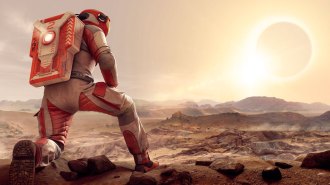 Space
Space‘Spacefarers’ predicts how space colonization will happen
In Spacefarers, Christopher Wanjek provides an optimistic yet realistic view on how humans might colonize the rest of our solar system.
-
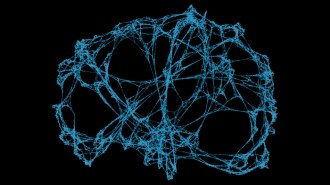 Physics
PhysicsStephen Wolfram’s hypergraph project aims for a fundamental theory of physics
Simple rules generating complicated networks may be how to build the universe.
-
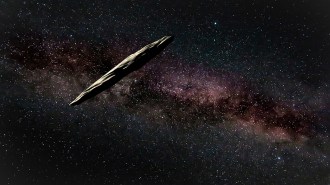 Astronomy
Astronomy‘Oumuamua might be a shard of a broken planet
A new origin story for the solar system’s first known interstellar visitor suggests it may have been part of a world that got shredded by its star.
-
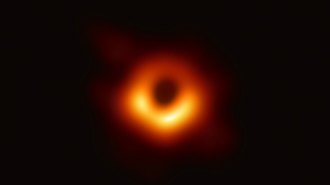 Physics
PhysicsA year after the first black hole image, the EHT has been stymied by the coronavirus
With this year’s observing run canceled due to the coronavirus, the Event Horizon Telescope team is analyzing data from 2017 and 2018.
-
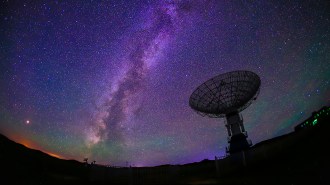 Space
SpaceNew search methods are ramping up the hunt for alien intelligence
Six decades of radio silence hasn’t stopped scientists searching for intelligent life beyond Earth. In fact, new technologies are boosting efforts.
-
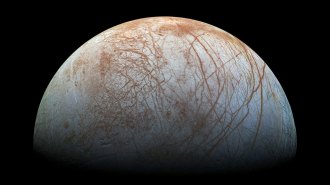 Space
Space‘Alien Oceans’ argues the search for E.T. should include the outer solar system
In Alien Oceans, a NASA scientist explores the evidence that ice-covered moons host hidden oceans, where life could evolve and thrive.
By Sid Perkins -
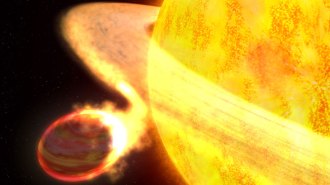 Space
SpaceRed giant stars that eat planets might shine less brightly
Some stars may shine less brightly after ingesting a planet. That finding, if confirmed, could have implications for calculating cosmic distances.